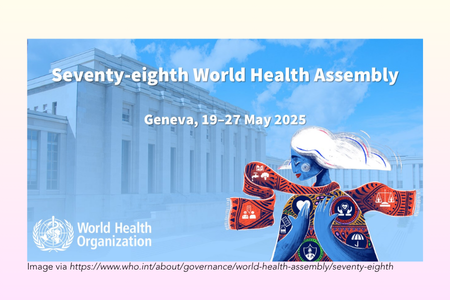What Was Missing at WHA 78: The Case for Dedicated Nutrition Funding

The 78th World Health Assembly (WHA) recently brought together world leaders, health experts and advocates under the theme “One World for Health”. With nutrition challenges deepening, maternal health progress stalling, and health systems facing funding shortfalls, WHA discussions have revealed both promising developments and persistent gaps in global health. While the Assembly made historic commitments to health financing, it missed a critical opportunity to confront the chronic underfunding of nutrition—a gap that could jeopardize the very health targets it aims to achieve.
AN EMERGENCY IN HEALTH FINANCING
One of the resounding themes from the 78th WHA was the need to improve financing in global health. As the WHO Director-General put it, "the world is in a health financing emergency". World leaders responded to this crisis by pledging at least an additional $170 million to WHO, with the potential to save 40 million lives over the next four years. This is particularly crucial for nutrition interventions, which have historically been underfunded despite their proven impact on preventing illness, reducing healthcare costs, and ensuring productivity.
Despite this significant commitment, dedicated funding streams for nutrition interventions were not outlined. This funding is essential as it underpins almost all health outcomes; unlocking the potential of food systems is key to boosting productivity and fostering both human and planetary well-being. While countries commit to ambitious health targets, failing to recognize the importance of financing nutrition in national health budgets will result in broader health goals remaining out of reach.
THE FIGHT AGAINST MALNUTRITION
Despite years of global commitments, progress against malnutrition has stalled in critical areas. A new WHA resolution recommitted countries to tackle malnutrition in mothers, infants, and young children. The global nutrition targets were extended to 2030, with stronger commitments in areas where progress has lagged. These renewed goals include the following:
-
A 40% reduction in the number of children under five years of age who are stunted, compared to the 2012 baseline.
-
A 50% reduction in anaemia in women of reproductive age, compared to the 2012 baseline.
-
A 30% reduction in low birth weight, compared to the 2012 baseline.
-
Reduce and maintain overweight in children under five years of age to less than 5%.
-
Increase the rate of exclusive breastfeeding in the first six months up to at least 60%.
-
Reduce and maintain wasting in children under five years of age to less than 5%.
To reach these targets, countries adopted new process indicators like improving dietary diversity, supporting breastfeeding, and ensuring access to iron-containing supplements during pregnancy. This resolution aims to unite countries in addressing the long-term negative impacts of malnutrition on individuals, communities, and national development.
While these targets are encouraging, they echo similar commitments left unmet due to insufficient and inconsistent funding. By focusing only on what needs to be done, rather than how targets will be funded, these goals risk remaining aspirational rather than actionable commitments. At a time when current funding cuts could lead to 369,000 preventable child deaths annually, nutrition cannot be left as optional in larger health budgets.
PREPAREDNESS AND THE PATH FORWARD
One of WHA 78’s historic moments was the adoption of a Pandemic Agreement designed to strengthen surveillance, countermeasures, and international coordination. While the commitment is encouraging, it comes during a particularly challenging period for global health, with funding cuts from multiple aid donors creating additional pressure on already strained resources.
The Assembly's emphasis on country self-reliance and sustainable progress toward universal health coverage signals a shift toward long-term, systemic solutions rather than short-term intervention. However, this approach risks further marginalizing nutrition if countries don't recognize it as essential health infrastructure that requires dedicated, protected funding. The increased recognition of the global malnutrition crisis creates openings for integrated programming, while the emphasis on domestic financing highlights the need to work with governments to ensure nutrition remains a priority even when external funding is limited.
Despite the new ambitious global targets, the challenge of investing in health remains unchanged. Nutrition receives less than 1% of global official development assistance, though it has the potential to generate $16 in economic returns for every dollar spent. Until we change this fundamental imbalance, the ambitious targets set at WHA 78 will remain as unfulfilled as those that came before them.




